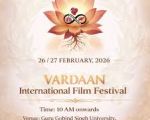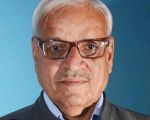The inaugural session, held at the Faculty of Arts, University of Delhi on March 4, 2025, provided valuable insights into the course structure and the significance of manuscripts in understanding the rich history of Bharat. The discussion also highlighted the role of the National Mission for Manuscripts in preserving this invaluable heritage.
The session was graced by esteemed guests, who emphasised the importance of bringing manuscripts into the mainstream discourse and ensuring their accessibility for scholarly and cultural enrichment.
Dr. Prerna Malhotra, Joint Director and Program Coordinator, Centre for Hindu Studies, University of Delhi stated that Bharat possesses the largest collection of manuscripts in the world. According to estimates, more than 10 million manuscripts are currently available, and approximately one crore (10 million) Bhartiya manuscripts are scattered across the globe. The challenge lies in retrieving them, deciphering their profound meanings, and distilling their essence. This is a significant undertaking for India and is crucial for preserving its rich intellectual heritage.

She emphasised the need to move beyond a Eurocentric mindset and adopt a perspective rooted in our own traditions to understand the world. Continuous study of these manuscripts is essential to safeguarding our cultural and spiritual heritage. Concluding her lecture, she remarked that this workshop marks the first step toward presenting Indian culture to a wider audience.
The Chief Guest, Prof. Amitava Chakraborty, Dean, Faculty of Arts, University of Delhi, encouraged students to actively engage in the study of manuscripts, emphasising their role in advancing the mission of Viksit Bharat. He underscored the importance of understanding these ancient texts, as they hold invaluable knowledge that can contribute to Bharat’s intellectual and cultural revival. Prof. Chakraborty also inspired students to promote awareness about manuscripts at the grassroots level, recognising them as a treasure of Bharat. He stressed that fostering a passion for manuscript studies among the younger generation is crucial for the revival of Bharatiya Gyaan, ensuring the preservation and dissemination of India’s rich scholarly heritage.
The Guest of Honour, Prof. Anirban Dash, Director, National Mission for Manuscripts, highlighted manuscripts’ roles across three key dimensions: Lipi (script), Bhasha (language), and Vishay (subject matter). He emphasised the necessity of developing a structured methodology for decoding manuscripts, which is essential for capacity building and the preservation of Bharat’s heritage.
Prof. Om Nath Bimli, Director, Centre for Hindu Studies, University of Delhi, in his address, awakened the intellectual consciousness of the students and urged them to make their lives meaningful by recognizing the significance of being born on the sacred land of Bharat. Emphasising the importance of manuscript studies, he highlighted the relevance of Vachaspati Mishra’s seminal work, “Brahma Tattva Samiksha”, underscoring its invaluable contributions to Bharat’s knowledge tradition. He stressed that preserving and studying manuscripts, while mastering various scripts, is essential for the continuity of Bharat’s heritage. Speaking on heritage and progress, he emphasised that true development lies in advancing forward without forsaking the wisdom inherited from the past.





